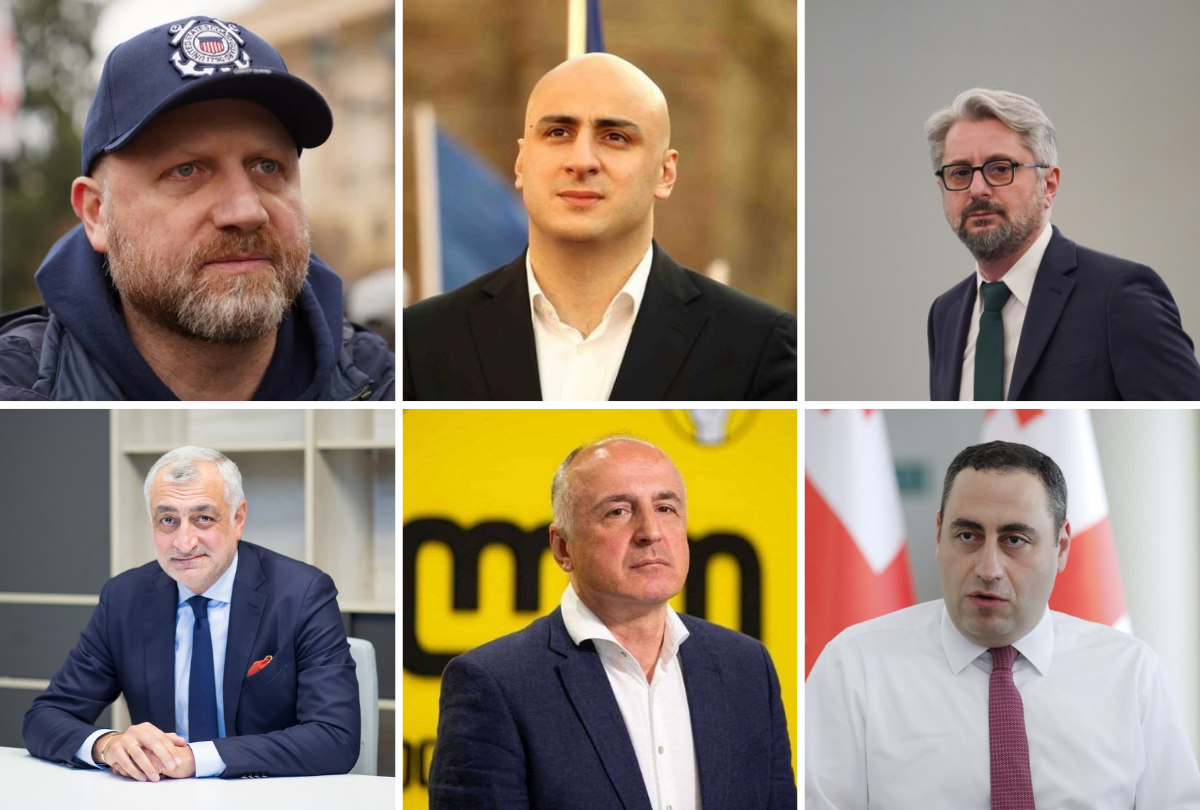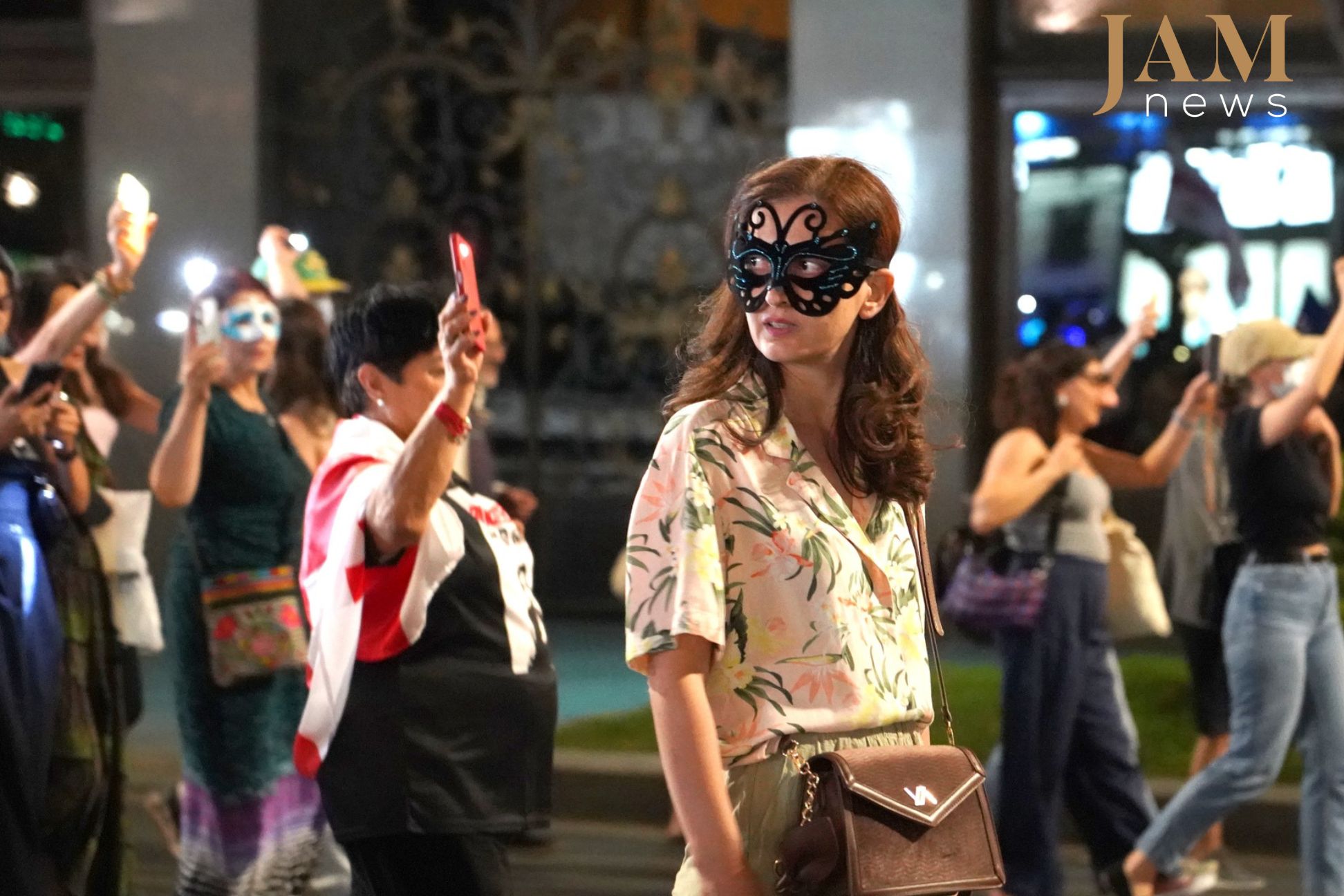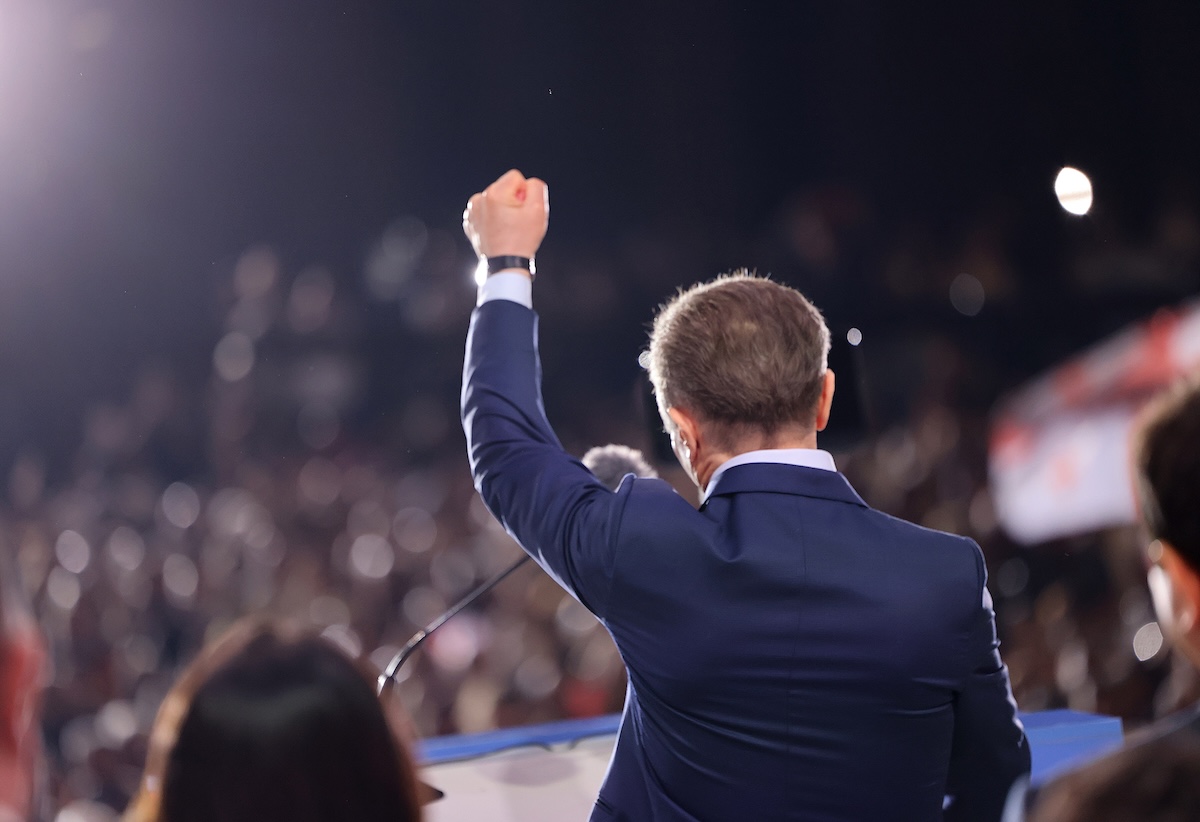Opposition figure Gela Khasaia arrested in Georgia: what we know so far
Opposition arrests continue in Georgia
Another opposition politician has been detained in Georgia. Gela Khasaia, a member of the party Girchi — More Freedom (Coalition for Change), faces charges of intentional minor bodily harm committed as part of a group. If convicted, he could face four to six years in prison.
On the evening of 1 October, Tbilisi City Court judge Nana Shamatava ordered Khasaia to be held in pre-trial detention.
The decision sparked unrest in the courthouse yard. Court bailiffs forcibly removed Khasaia’s friends from the building, with several people injured. Journalists covering the hearing were also pushed out.
Gela Khasaia is originally from the city of Gali in Abkhazia and has been living in Tbilisi since 2017.
Khasaia has long been in the sights of law enforcement as a member of an opposition party and an active participant in protests, during which he has repeatedly faced attacks by police. He has also been arrested on administrative charges.
The criminal offence he is accused of allegedly took place on 1 September, but he was not arrested until almost a month later, on 29 September. Both Khasaia and his lawyer claim the case has been fabricated from start to finish to prevent him from taking part in protests planned ahead of the municipal elections on 4 October.
Gela Khasaya’s arrest
Gela Khasaia was arrested late on the evening of 29 September. Friends and party colleagues only learned of his detention by accident.
‘We were returning home together from a protest, and I asked him to message me when he got home. In our group, there’s a tradition—not to sleep until the last of us gets home. When some time passed and he hadn’t called, I suspected something was wrong and started calling him. The call went through, but he didn’t answer. Eventually, his phone was switched off. That’s when I realised Gela was in police custody. Later, an investigator called to tell me he had been arrested,’ wrote Khasaya’s friend and the party’s PR officer, Ana Kurashvili, on social media.
Khasaya’s friends spent the night at the detention centre, trying to find out why he had been taken.
The following morning, the Ministry of Internal Affairs released information about Khasaia and another individual’s detention. They were accused of committing a crime as part of a group. According to the statement, on 1 September in Tbilisi, near Tamar Mepe Avenue, they allegedly raped a woman and fled the scene. The victim required medical assistance.
Charges against Gela Khasaya
The case against Gela Khasaia was initially opened under the article ‘Intentional minor bodily harm’ (Article 120 of the Criminal Code of Georgia), which carries a prison sentence of three to five years.
On 1 October, prosecutors upgraded the charges. In a statement, the ministry said Khasaia is now accused of ‘intentional minor bodily harm committed by a group of persons’ (Part 2 of Article 118), punishable by four to six years in prison.
At his court hearing, Khasaia described the circumstances of his arrest:
‘I left a protest and was heading home when, as soon as I turned onto my street, about ten people surrounded me. They grabbed my arms and tried to take my mobile phone. I didn’t want them to have my personal data, and I managed to lock the phone. Then they put me in a car.’
Khasaia recalled that the officers did not identify themselves, although one of them was a police officer he had often seen at protests: ‘He kept telling me all the way: “I know what you did, and I promised you I would arrest you.”’
Search and treatment in custody
According to Gela Khasaia, after his arrest he was taken to the police station on Agmashenebeli Avenue:
‘They searched me twice. By search, I mean they completely stripped me. After the first time, I thought it was over, but 20 minutes later they stripped me naked again.’
He said the officers frequently mentioned the imprisoned journalist Mzia Amaglobeli and activist Saba Skhvitariadze.
Khasaia’s lawyer, Omar Purtseladze, stated that 30 police officers were involved in the strip-search, during which they insulted and threatened him.
‘What happened there, I wouldn’t wish even on my worst political enemy. It was a deeply unhealthy act,’ Khasaia told his lawyer.
Why was Gela Khasaia arrested?
Immediately after Gela Khasaia’s arrest, his lawyer Omar Purtseladze stated that a conflict did indeed occur on the territory described by the Ministry of Internal Affairs on 1 September. Khasaia was a witness to the incident but did not take part in it.
Nanuka Jorjoliani, founder of the Nanuki Foundation and an activist, shared her version of events on social media. According to her, on 1 September Khasaia encountered three strangers on his way home who introduced themselves as his supporters. After a brief conversation, they asked Khasaia to buy them beer.
‘Gela bought them beer. Afterwards, the three strangers started fighting. Gela did not intervene. Once they began attacking each other, Gela calmly left the area,’ Jorjoliani wrote.
On 30 September, the morning after the activist’s arrest, the Ministry of Internal Affairs told the InterpressNews agency that Khasaia’s companions that night had confirmed the alleged victim was beaten by him during the incident. The agency reported that Khasaia attempted sexualised violence against the victim and acted aggressively towards her.
At the hearing to decide his pre-trial detention, the prosecutor stated that Khasaia and another man, Vasil Kerdikoshvili, had allegedly raped the victim, beaten her legs, and broken her wrist.
What Khasaia’s defence says
Gela Hasaya’s lawyer, Omar Purtseladze, claims that Hasaya does not know the second person accused alongside him of the alleged group offence. Hasaya only learned the individual’s name from the case materials.
According to the lawyer, there is no objective evidence in the case—no video footage or eyewitness testimony—only statements from the alleged victims.
“We did not have the opportunity to fully review the case materials in such a short time. However, after going through the list of evidence, we found that at this stage there is no objective proof, such as CCTV recordings or other documents containing similar information. The case contains only the statements of these individuals [the alleged victims],” Purtseladze said.
The defence argues that the charges against Hasaya are political from start to finish. The lawyer added that Hasaya himself views the case this way.
“Hasaya has long been threatened with arrest and imprisonment for his public, civic, and political activities. Even after his detention, he was told that they had ‘kept their promise,’ and that is why he is in custody on this criminal case,” the lawyer said.
Who is Gela Khasaia?
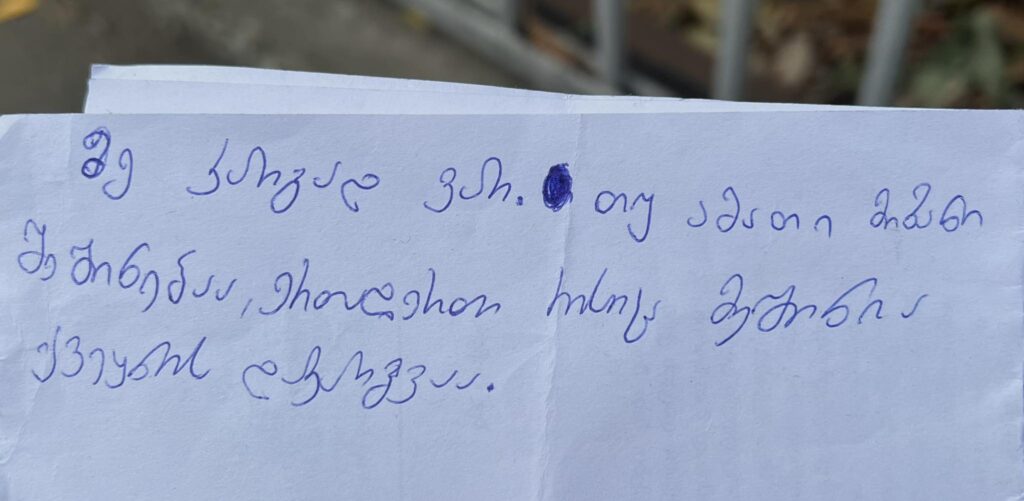
‘I’m fine. If the aim [of the arrest] is to intimidate me, the only thing I fear is losing my country,’ Gela Khasaia wrote from pre-trial detention shortly after his arrest.
Khasaia is from Abkhazia, born and raised in Gali. After finishing school he studied at Sukhumi State University. In 2017 he was forced to leave Gali and his family.
Before leaving, he painted the words ‘I will see you here again’ on an abandoned house in Sukhumi.
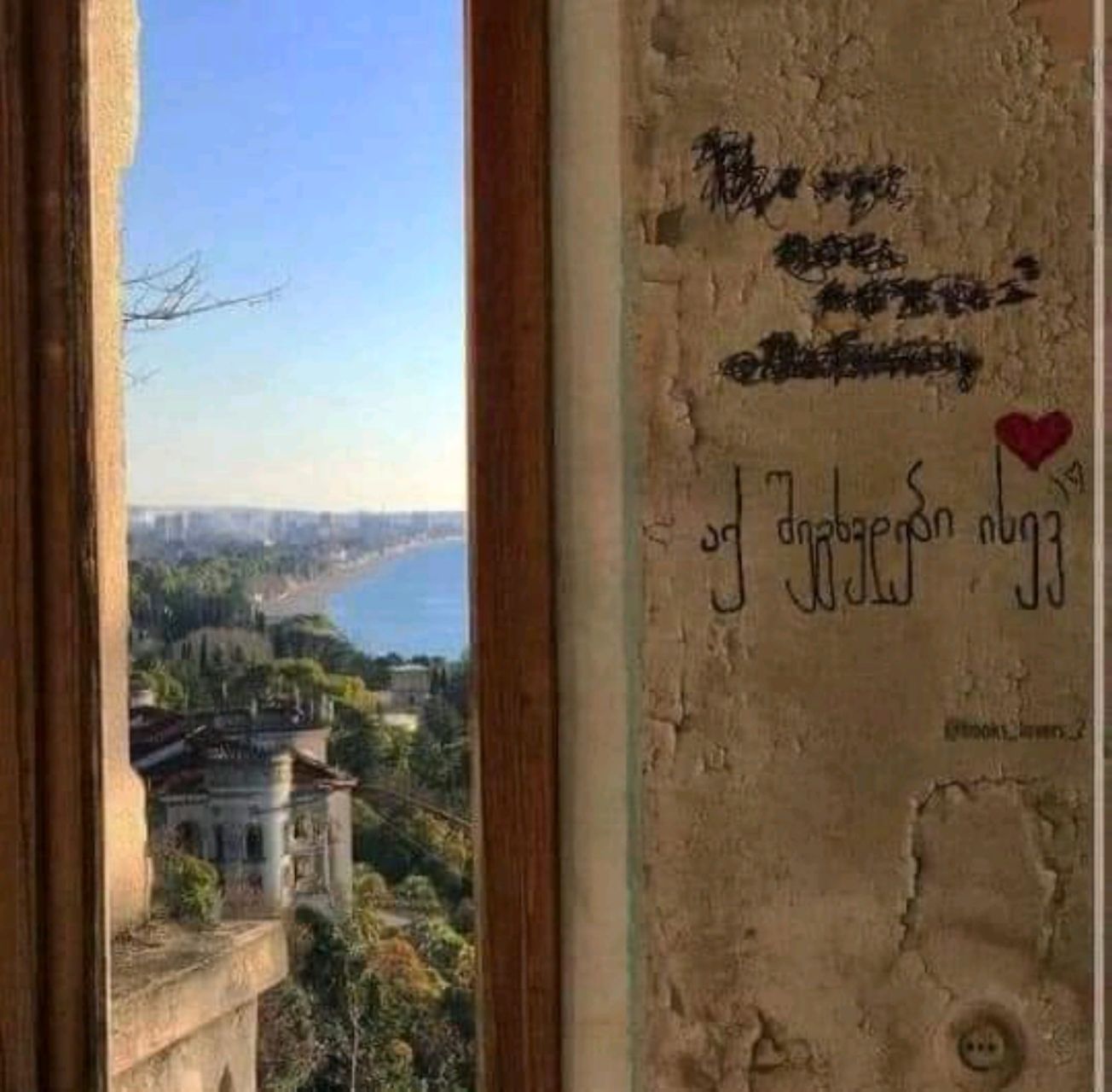
The activist’s family — his parents and brother — still live in Gali, though they are able to leave the occupied region only every few years.
Shushana Matsaberidze, a friend of Gela Khasaia, told Batumelebi that Khasaia has been opposing the pro-Russian regime in Tbilisi for several months, far from his family and hometown.
“Gela was very active during his studies at Sukhumi State University and always loudly declared, ‘Abkhazia is Georgia.’ He worked as a guide, informing tourists visiting Abkhazia about the Russian occupation — that Abkhazia is part of Georgia and occupied by Russia. He always spoke the truth, which is why the authorities effectively began persecuting him. He was charged with treason and forced to leave his home,” Matsaberidze said.
Gela Khasaia is a member of the opposition ‘Coalition for Change,’ whose leaders are already in prison: Elene Khoshtaria, Zurab Japaridze, Nika Gvaramia, and Nika Melia. All four have faced unsubstantiated charges.
Three opposition figures were sentenced to prison for failing to appear before the Georgian Dream parliamentary commission investigating the Saakashvili government. Elene Khoshtaria was arrested for writing the words ‘Russian’ and ‘Russian Dream’ on a pre-election banner for Tbilisi mayoral candidate Kakhi Kaladze, the incumbent mayor.
Another coalition member, Saba Skhvitariadze, was arrested during pro-European demonstrations. A judge found him guilty under Article 120, Part 1 of the Criminal Code (intentional minor bodily harm) and sentenced him to two years in prison.
The Tbilisi City Court is set to begin hearings in Gela Khasaia’s case at the end of November.
Opposition arrests continue in Georgia










